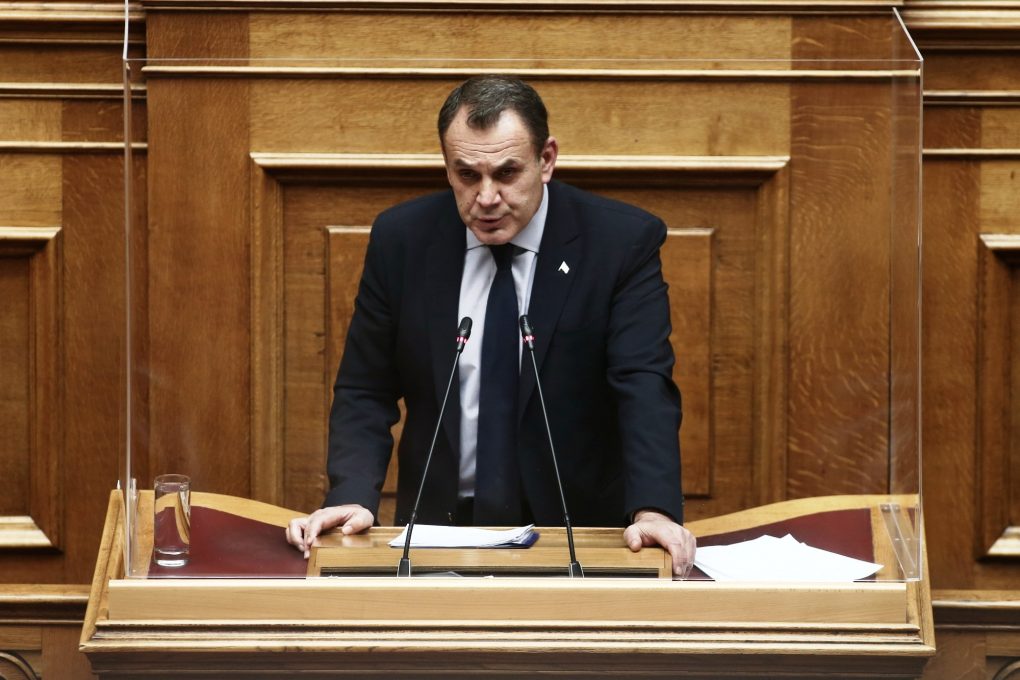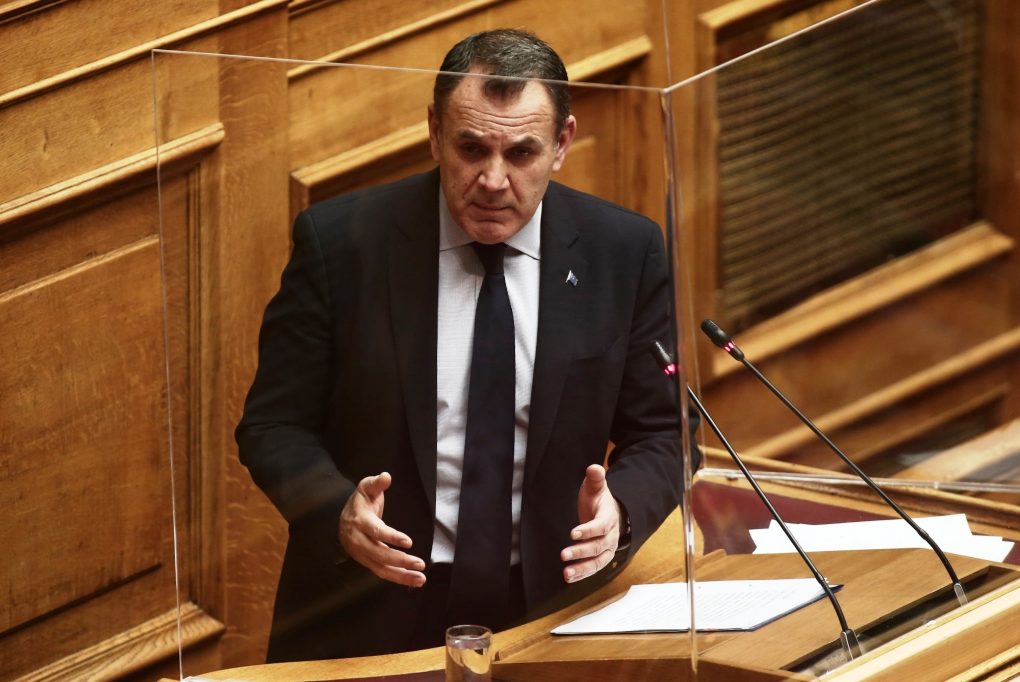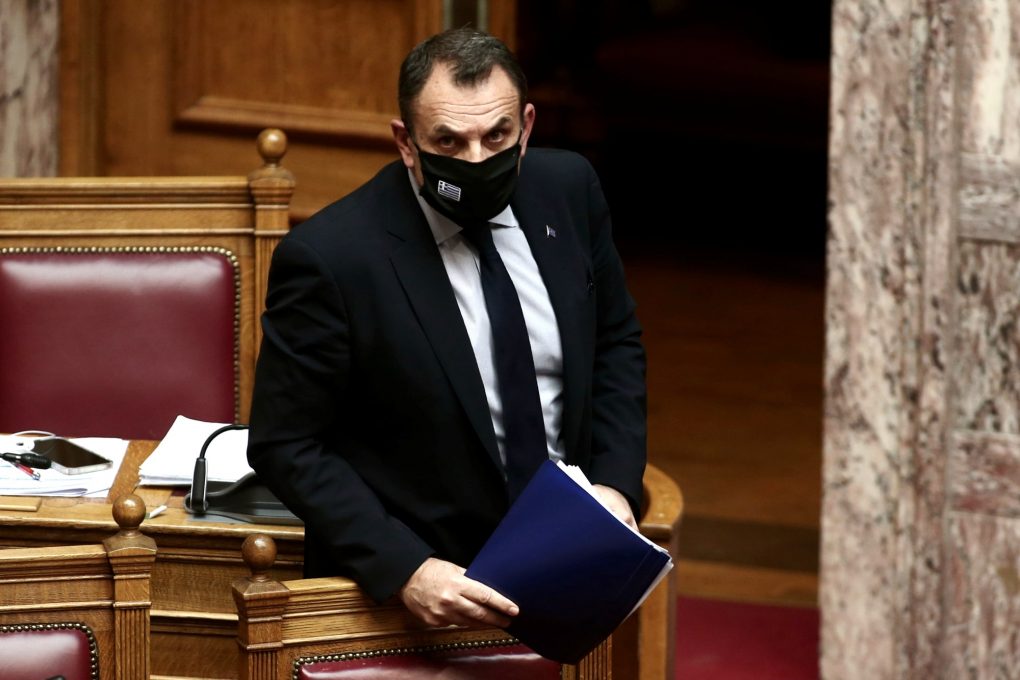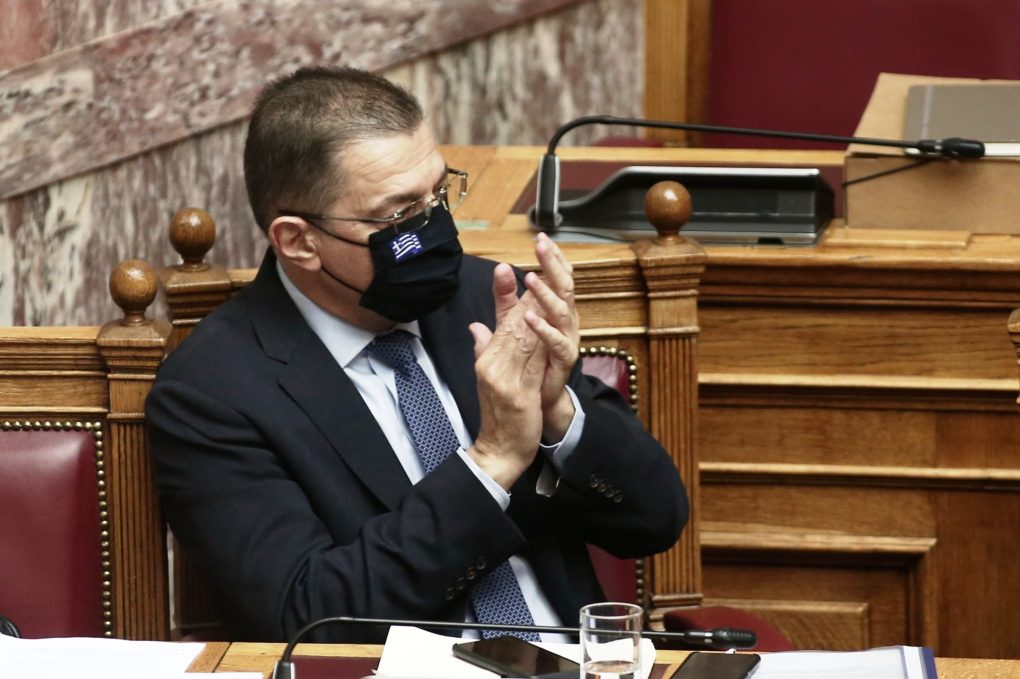On Thursday, 4 March 2021, the Minister of National Defence, Mr. Nikolaos Panagiotopoulos, addressed the Plenary Session of the Hellenic Parliament during the discussion and voting on principle of the articles and the entire bill “On the modernisation, simplification, and reform of the regulatory framework on public contracting, specific procurement regulations in the areas of defence and security, and other provisions on development and infrastructure”.
The Deputy Minister of National Defence, Mr. Alkiviadis Stefanis, was also present. Mr. Panagiotopoulos stressed the following:
“Mr. Speaker,
Ladies and Gentlemen, Members of Parliament,
I just heard, among others, some very toxic, intense, and charged words from the fellow MP that just left the floor. Allow me two comments, one on what was heard and one on what is discussed these days in the public sphere.
The first comment is that the Armed Forces are once again there, together with the other state authorities, to support and assist the community in the broader area of Elassona, which bears hardship and suffers from the impact that yesterday’s big earthquake had on everyday life. The Armed Forces have always, even during peacetime, been there for society when things get difficult with actions, with great support activity.
The second comment is that I think that the country must finally move forward. ‘No matter what, we must move forward’, to quote the poet.
The virus is on the rise. Relaxation by part of the population of obedience to the measures will lead to further deterioration and further deterioration will lead to the need for additional measures. The need for additional measures not only postpones the state of alert and moves the finish line further back, but also causes even more irritation, fatigue, frustration, and anger. Nerves are tense. There is fatigue, insecurity due to the great economic uncertainty. Balances are fine.
Under these conditions, the last thing that the public sphere needs right now is more poison, more toxic discourse. I will not comment on Mr. Dritsas’s recent public, I would say outrageous, statements. A lot has been said on that. I think he himself has tried to take back what he said. A lot has been said on that; I will only add this: Such statements and their reproduction needlessly poison public life.
They divert the conversation away from the major challenges, they push the country back and the country must move forward. And to take public life forward we need less of Lignadis, less of Koufontinas, and more of Iakovos Tsounis.
I am referring to the Greek patriot who was recognised by the President of the Republic a few days ago, he was decorated. Earlier, a few months ago, he had been awarded by the Ministry of National Defence the rank of honorary Major General for his overall contribution to the reinforcement of the Armed Forces. This man decided to leave in his will – in addition to everything else he had done so far to reinforce the Armed Forces with assets – all his fortune to the Armed Forces.
He is a great example, a model patriot, the likes of which we need more than ever. People who do not spend every day of their life wondering ‘what the country can do for them, but what they can do for the country’. These are the models we need. So, based on what we can do for our country, allow me to reduce this to our certainly less important case.
The defence procurement reforms discussed, which are expedited by the Ministry, are no negligent matter. They constitute a great and useful improvement of the institutional framework to the extent allowed. The limit is the EU Directive, from the spirit of which we can’t diverge, but we can make certain special targeted improvements, because for a long time, everyone, across all parties, saw the need for these reforms, but did nothing about it. So, we come today to do something.
The bill discussed today includes and completes the necessary interventions in the critical domain of Public Contracting in general. The goal is to improve and speed up the procedures for the programming, implementation, and conclusion of Public Contracts, to consolidate the security of law and to achieve the much-desired combination of speed, effectiveness, and transparency.
The need to improve the institutional framework on Public Contracting in the area of Defence has been expressed many times and in many ways, both within the Armed Forces (mainly by those involved in the procedures concerning the conclusion and implementation of military equipment contracts, i.e. the people who experience in their everyday life the difficulty, the complexity, and the sluggishness – I would say – of the conclusion of these contracts), as well as within the Parliament by the MPs in the Committee for Foreign Affairs and Defence and the Armaments Committee.
The Government’s strategic planning to enhance the deterrent power of the Armed Forces is based on the timely implementation of each armaments programme as approved by the competent authorities of the Armed Forces and the Parliament.
A basic tool for the implementation of this armaments programming is a modern, cohesive, and effective Public Contracting regulatory framework. So, the proposed reform of the law governing the programming of the conclusion and the implementation of Public Contracts in the area of Defence moves in this direction of long-term reinforcement, availability, and effectiveness of the country’s weapon systems. If we provide this ability, we provide what is necessary to support the Armed Forces personnel in the performance of their mission, as well as the ability for effective strategic management of the country’s deterrent capability.
So here, the second part of the bill includes the reforms in Public Procurement, Service, and Project Contracts in the area of Defence we deemed urgent and necessary. In order to shape the new institutional framework, we took into consideration views and proposals by the Ministry’s competent authorities, as well as the need to support the Domestic Defence Industry to a greater extent than until now while in line with and within the limits of fair competition capabilities provided by national and EU law. In any case, particular emphasis and importance is laid on meeting the requirements of audit, transparency, and effectiveness during the administrative procedures pertaining to the implementation of military equipment contracts.
We examined these in detail during the two-day discussion in the Committee. We took into consideration remarks and interventions by fellow MPs. I appreciate that this was a constructive procedure because everyone acknowledged in principle the necessity of this reform, had a positive stance towards it, and each contributed from their point of view with remarks – many of which were taken into consideration – in the final result of this bill.
So, there is a targeted amendment of Provisions of the applicable Public Contracting institutional framework. The focus was to restore the balance between the requirements of the Awarding Authority and the modern materials in the market and Public Administration.
This part is structured into three sections corresponding to each stage of military equipment procurement:
-
The first has to do with the programming of this procedure in the first articles. It pertains to the procedures to identify the requirements and out them in a single operational and financing schedule until the decision to implement the procurement.
-
The second has to do with the contract conclusion stage, pertaining to the bidding procedures leading to the selection of an economic operator as contractor and the conclusion of the relevant contract.
-
The third has to do with the implementation stage of the contract and pertains to the monitoring and audit procedures for the smooth implementation of the contract until completion.
The existing legal framework, which we are called to improve, concerning Defence contracts, certainly contributed to a satisfactory degree, but did not entirely met the needs of the Armed Forces. During the implementation of the law’s provisions there were weaknesses and delays, voids, and inconsistencies with the modern conditions of the market which prevented what we do today with the proposed reform. I will not say that the existing legal framework is (as many call it) a “Non-Procurement Law”, because procurements are made when necessary and as required by the conditions such as the current ones. The conditions necessitated certain procurements outside the existing regulatory framework and we did that, but I believe there is much room for improvement.
So, concerning the programming of Defence Equipment procurement, the existing provisions for the preparation of the long-term and rolling programming were not implemented, to a certain degree due to conceptual vagueness with regard to the scope or the financing, among others, leading to individual activations of the programmes with repetitive approval cycles, thus adding administrative and bureaucratic cost for each individual programme. In addition to the fragmented character of the interventions, i.e. when we deemed that we must proceed to the approval of a certain armament subprogramme, this did not take place within the framework of a broader planning as required by the Long-Term Defence Equipment Programme.
Law 3978/11, which incorporated the European Directive into national law and regulates matters of tendering procedure and contract conclusion, provided certain excessive requirements and actions for the economic operators. Over and above the EU’s provisions, resulting in reduced participation of economic operators in tendering procedures and failure to smoothly and effectively conduct tenders for armaments. Given the fact that this procedure is mainly defined by the EU Directive, there was no margin for radical modification of the provisions. The proposed interventions concern regulations of Greek law and mainly those negatively impacting the participation of economic operators, both Greek MMEs and many foreign companies.
I will not speak at length, there is no time, I repeat the structure and a few main elements of our interventions: Section B includes articles 143-199. The first chapter includes articles 143-146 on matters of Public Defence Contract programming. The second chapter includes articles 147-166 on matters of Public Defence Contract conclusion. The third chapter includes articles 167-176 and defines the framework for the implementation of Public Defence Contracts, while the final chapter includes transitional provisions. You understand the need for reasons of security and integration of Law, these provisions are included in the Ministry of Development’s big Bill on Public Contracting and you understand the sequence from the programming and planning to the final implementation of Public Defence Contracts.
Most important amendments concerning contract programming and activation procedure, first articles 143 to 146:
-
Detailed description of the parts of the Mid-Term Defence Equipment Programme and the Rolling Programme.
-
Reference to Armament programme financing sources.
-
Reduction of the limit of contracts of great economic value to €30 m for reasons of transparency, with expedition of the procedures for all the rest, with a semi-annual review briefing of the Parliament (important) instead of the procedures for introduction of the matter for a decision by the Governmental Council on Foreign Policy and National Defence and an opinion by the competent Parliamentary Committee.
By separating the contracts introduced for approval based on value, we expedite the procedure by submitting it to Parliament only once, together with the Long-Term Defence Equipment Programme in order to avoid bringing fragmented subprogrammes here and there, thus causing delays.
Another provision: Ability to use framework agreements as follow-on support contracts when the terms can not be agreed in detail in advance (something that happens in practice all the time) by outlining essential terms and then finalising the terms in the contract, the implementing contracts following the framework agreement. We did that last year using a special legal provision for the follow–on support of the ‘Mirage 2000-5’. We passed that by special Law and, as you understand, this can not be done automatically, since it is part of this reform, hence the existing legal framework.
Another important reform is the introduction of the European Single Procurement Document by means of article 160: This remarkable amendment comes with the provision for the use of the new European Single Procurement Document, as well as of the Standardised Self Declaration Document. As you understand, this saves a lot of time which was spent until now on bureaucratic and administrative procedures since each company individually collected the certificates, using different types of documents for these contracts. Now there is a single document type also provided by EU Law.
Furthermore, there is the important provision on letters of guarantee and amendments of contracts and framework agreements during their term. We proceed to a reduction of the letters of guarantee amount for participation from 5% to 2% an for good performance from 10% to 5%. This will facilitate the issuance of the letters of guarantee by the financial institutions with which the economic operators cooperate, thus facilitating them in providing letters of guarantee and consequently participating, thus boosting competition during the initial tendering procedure. So we boost competition and enable more economic operators to participate.
I would like to make a comment on article 159 on the addition of conditions and the review procedures of article 346 of the Lisbon Treaty, according to which Member States, by exception of the provisions of EU Law on Defence procurement, may do their own programming and planning with regard to defence procurement if they deem that this serves their vital Security interests. Until now, this was provided by the applicable institutional framework, but there was insecurity of Law, i.e. this exemption was never implemented. It was difficult, since the framework was unclear, to invoke the exemption of article 346 of the Lisbon Treaty to prepare a contract against the applicable framework.
Now it is expressly provided that the decision to exempt a military equipment contract from the rules of the EU market is made by the Governmental Council on Foreign Policy and National Defence upon agreement of the Special Standing Committee on Armament Programs & Contracts of the Hellenic Parliament. The European Commission can exercise the responsibilities described in article 348 of the Lisbon Treaty, having the option to bring the matter before the Court of Justice against the Member State in case of improper use of the provisions of this article. As you understand, in times of crisis and tension, this ability is very important for the overall programming of the Armed Forces concerning armaments.
Ladies and Gentlemen,
The Hellenic Armed Forces play a very critical and demanding role in protecting our country’s independence and territorial integrity. Meeting the operational and supply requirements of the Armed Forces requires a suitable Public Contracting system affording, on one hand, the necessary flexibility and speed concerning the contract award procedure and, on the other hand, savings in terms of time, administrative, and bureaucratic costs, as well as improvement of services provided. It is a matter of balancing speed, effectiveness, and transparency.
Having secured the operational readiness of the Armed Forces, the Ministry of National Defence can proceed to the mid to long–term planning of National Defence with a clear head, certainty, and confidence that the Armed Forces are always available, reliable, deterrent, and strong at national, regional, EU, and international level.
I believe that this bill and the provisions introduced by the Ministry of National Defence to improve the framework on Public Defence Contracts is an important – perhaps more important than we thought – step in order to achieve these goals for stronger Armed Forces. I kindly thank the parties that supported the necessity to approve this important reform.
If you allow me, Mr. Speaker, because Mr. Kegeroglou has submitted a modification and I don’t want to interject later, to comment for a minute on this. Sir, the modification is in principle in the right direction, however it has been regulated by Ministerial Decisions.
It’s the modification with general number 784 and special number 53. It was submitted today by MP’s of KINAL under the title ‘Upgrade of the GDDIA and the Defence Research, Technology, and Industry Council’, on which I would like to stress the following:
It is deemed that the proposed responsibility of the Defence Research, Technology, and Industry Council is covered legally both by par. 1 of article 13 of L. 2919/01, which provides that the Council proposes the main options during the programming of Governmental Policy in the area of Defence Research and Technology, as well as in the area of Defence Industry, within the framework of the National Defence Industrial Strategy, as well as by par. 2 of the same article. Consequently, the existing legal framework covers what you correctly propose.
Furthermore, the Defence Research, Technology, and Industry Council meets twice per year, as well as extraordinarily. Article 3 of the Ministerial Decision issued on 16 October 2020 by the Ministry of National Defence also provides that the Council can also meet upon proposal of one of the entities representing the Domestic Defence Industry, this is provided by the above Ministerial Decision. It deemed necessary, this Council can meet.
You are correct to ask that to happen, perhaps more consistently, periodically, and frequently, because this advisory council adds to the planning capabilities, particularly in the area of the Domestic Defence Industry, but this is already provided and exists in the general Regulatory Framework, both in a Law, as well as in a Ministerial Decision. Consequently, the modification is welcome, but not accepted because this ability is already institutionally provided. In any case, however, we agree in principle.
Thank you“.










